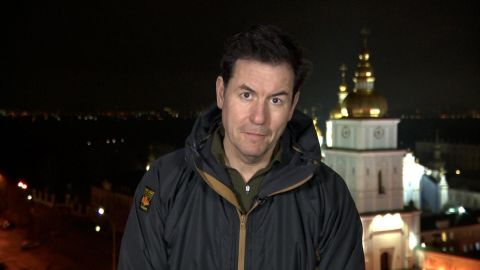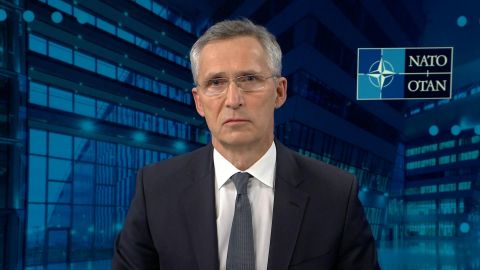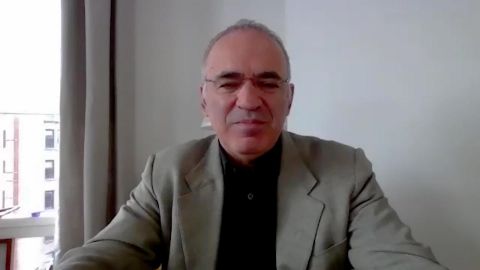Read Transcript EXPAND
CHRISTIANE AMANPOUR: Now, chess of course is a game of rules, but Putin is demonstrating that he follows no one’s rules but his own, a vocal critic, is Garry Kasparov, the Russian chess grandmaster, who ranked world number one until turning his attention to politics, and once attempting to run for president in Russia. He’s now telling leaders to quote help Ukraine fight against the monster you have helped create. As we said, around a thousand people have been detained in antiwar protests across Russia as Putin cracks down on demonstrators, Kasparov sat down with Walter Isaacson.
(BEGIN VIDEOTAPE)
WALTER ISAACSON, PROFESSOR OF HISTORY, TULANE: Thank you, Christiane. And, Garry Kasparov, welcome to the show.
GARRY KASPAROV, CHAIRMAN, THE HUMAN RIGHTS FOUNDATION: Thank you for having me.
ISAACSON: You know, unfortunately, you turned out to be right. As Russia’s most famous chess master, you led the democratic opposition to Vladimir Putin, and in 2015, you wrote a book called “Winter is Coming” and its sub title was: How Vladimir Putin and Enemies of Free World Must Be Stopped. Now that we see what he’s doing, what should our response be?
KASPAROV: As a professional chess player, I always wanted to analyze my mistakes if I lost a game and went wrong before working on my next move and working with strategy. I think it’s important to recognize that Vladimir Putin has been preparing this war for many years. And unlike 1939 because parallels have been made with the late `30s of the 20th century, this war has been prepared in plain sight. One of the problems today is we call Putin’s decision irrational, he didn’t think it was irrational because he saw no consequences for his actions, for his crimes. And I think now it’s time to impose the price for what has been done because it is the only way to prevent him from moving even further. I believe that the free world still has resources to stop Putin at this point because what we know from history, from the 20th century, and Vladimir Putin’s recent history that every day of delay of our response to a brutal dictator is pushing the price to pay for his actions higher and higher.
ISAACSON: You say we can impose a price, and you say that price could slow him down or stop him. What is that price? And as somebody who’s lived in Russia, how could you do the most effective thing to stop him?
KASPAROV: I have been saying all along, it’s not about tanks, it’s about banks. Of course, now, Ukraine needs tanks, and it’s tragic that Ukraine is not meeting Putin’s aggression with sufficient military equipment that could have been supplied to Ukraine ages ago. But right now, it’s about Putin’s military machine that has been supported by hundreds of billions of dollars of cash that came from the free world. So there’s still many options to limit or even stop how effective Putin’s military machine that meets every day, every minute, needs money, and Putin has been allocating this cash. He’s sitting on a pile of cash, hundreds of billions of dollars, but it may evaporate if the free world cut the supply. I know that all of these sanctions will be very painful for the free world. No doubt that, again, the price that the free world will pay to stop Putin’s aggression is climbing, and it’s not that we can do something to help Ukraine without paying for the consequences here in the free world, but there’s no other choice. So I think cut Russia from energy sector, Russia gas and oil export, and also us immediately cut Russia from all the financial markets. Those are first two moves that are so natural.
ISAACSON: Will that help him at home or hurt him at home?
KASPAROV: This is — I mean, I — let’s stop this nonsense. It’s Putin is absolute dictator. He doesn’t care about public opinion. He doesn’t care about free press. So it’s one man and his gang that are making all the decisions, and you have to hurt them where it hurts, and of course, they keep their money abroad. Also hundreds of billions of dollars. Some people say probably already, one or $2 trillion in, in assets that spread around the world. Start looking for them, seizing them, confiscating them. This is the money that we need to pay for the consequences of this war. And also for helping Ukraine also immediately recall ambassadors just to demonstrate that it’s a war. I mean, show Putin and most important to people who are around him, that there’s a price to pay, and also Russia will be totally isolated. Okay. China is there, I don’t think China is, is going to compensate Putin for his losses, because what is whatever China wants now is to see the Western response to this aggression since China has been contemplating the similar move against Taiwan.
ISAACSON: In your book, your 2015 book Winter is Coming, you say that Putin is at the center of a worldwide assault on political liberty. Do you think that that’s his goal to stop political liberty, or is he mainly just worried about a military Alliance that’s against him, NATO being on his borders and in the heart of what used to be the Soviet sphere?
KASPAROV: I think Putin has his own ideology and he was quite blunt telling, telling about it, when he was rising, uh, in, in, in, in, in Russian politics even before he became president of Russia. So he talked about the collapse of the Soviet Union as the greatest geopolitical catastrophe of the 20th century. He also talked about a KGB, once KGB, always KGB now – no former KGB officers. And, year after year, he has been talking about Ukraine as a failed state. He never recognized Ukraine as a sovereign state. It’s not me saying, it’s Vladamir Putin year after year. And I think if we want to understand Putin’s philosophy, if you may call it philosophy, we should simply read again, his speech 15 years ago in February, 2007 in Munich at the security conference in Europe, when he talked about return to the spheres of influence. Basically, you know, just, you know, sending the message that he disagreed with the world security infrastructure built after world war II and let’s give him credit. So he has been very consistent in pushing this, this agenda – attacking Republic of Georgia in 2008, propping up Bashar al-Assad regime in Syria, and carpet bombing civilian targets across Syria. And next in Crimea, it’s a long list. And, I think, you know, just on the bottom of that is Putin’s belief that dictators, they are entitled to do whatever they want in their own countries, but also they can use force as the main argument in international relations. Putin’s attack on Ukraine is not attack on Ukraine only. It’s attack on the world security infrastructure, because he thinks it’s standing on the way of him or other fellow dictators to rule the world the way they want.
ISAACSON: You were world chess champion when you turned 22 in Russia, and you’ve written a book that I love, which was called Life Imitates Chess. And you start by saying, how do you evaluate opportunities as one of the lessons? How did he evaluate opportunities and how did we misplay that so that he thought he had opportunities?
KASPAROV: I think he had reached a point as every dictator did in the past where it’s not about calculating rationally from our perspective. Dictators never ask why it’s always, why not? And after so many years of paying no price for his actions, he believes now that he can get away with that, because the free world showed nothing but weakness. He’s quite cynical. And, and the fact is that he succeeded in buying Western politicians of a, of, of, of, uh, of a highest caliber, like Gerhard Schroder and many others. So prove to him that it’s, it’s all about price to pay. He doesn’t believe in NATO solidarity. He saw nothing but weakness in America over the last decade. And he thinks that the free world is divided, badly divided. And the way he reads the, the latest news from the international stages, he sees the, the rise of authoritarian in totalitarian regimes and the steady weakening of democracy. For him, it’s a historic revenge. So he thinks that, you know, the world should be run by big big guys and the smaller countries should simply, you know, abide.
ISAACSON: What do you think of the responses of previous American leaders, whether it be President Obama when the Crimean peninsula was invaded or President Trump who seemed to be on a friendlier course with Putin?
KASPAROV: It’s like a pendulum shifting from feckless to reckless. Obama ignored this threat. And, there were many, many defining moments, in, during his years that convinced Putin that America could only talk. And one of them of course, was the infamous red line in Syria. So that’s, that was really bad. And I predicted that the consequences of Obama not keeping his word and, and, ruining, Assad’s regime after using chemical, after the use of chemical weapon will resonate around the world. And of course the annexation of Crimea, was another test that the free world failed. And then of course, Trump. I mean, Donald Trump was a gift to Putin, and I believe no matter what is being decided by numerous commissions and investigations in America, I believe that Russia was behind this Trump’s beat, and Putin did absolutely everything to secure Trump’s elections in 2016, and tried to, to help him in 2020, because Donald Trump, for some reasons, adored Putin, and, and obviously though, was not ready to boost NATO solidarity. So Trump’s policies weakened European solidarity, European American solidarity, even further.
ISAACSON: And what about Republicans? What about Republicans now, Republican leaders now that seem to be siding almost with Putin or understanding what he’s doing – this rift in the Republican party?
KASPAROV: I think it’s the, the Republican party now should work is with this cognitive dissonance. It’s kind of schizophrenia. When you just look at, at, at, at the news, let’s say Fox news.com. And on one side you have Tucker Carlson and he’s accolades, and then you add some of the traditional Republicans, and Biden administration is being blamed for being too weak on Putin or being too harsh. So, it just shows that the party now is just, is so badly divided between those who still believe in America’s leadership and those who are just, you know, who are Trumpists. So would like, you know, America to, to, to withdraw. B the way, that’s not surprising in 1939, 1940, there were many Republicans at the time that wanted America to, to stay, you know, isolated and not to not to be involved because they, directly or indirectly is to, to, to Adolf Hitler’s actions in Europe. So again, the history repeats itself. And, it’s, again, it’s quite tragic that one of the most popular, TV channels in America is now is a home for what I see is, is bluntly UN un-American propaganda that is, is making Putin’s bidding. And it’s not surprising that these statements mainly from Tucker Carlson, they are just being regularly, uh, uh, uh, um, um, presented on Russian or Russian television. So it’s, and again, unfortunately that’s not only American, problem it’s across Europe we also saw many people mostly from the far right, but also from far left that were quite comfortable, supporting Putin’s security, proposals. Now they probably are silent, but still, you know, we, we heard even from Donald Trump himself, you know, calling Putin’s recent decisions, genius.
ISAACSON: You compared just now the sort of pro-sympathetic Putin types in the United States, including some Republican senators, to the 1939 appeasers who felt some sympathy for what was going on in Germany. They were called, they called themselves America firsters – that’s where the title came. Now the same people are using the phrase America first. What do you think of that?
KASPAROV: It’s a, I, I think it’s, it’s, it, it couldn’t be more obvious that there’s a parallel, because it’s not just about the name, it’s about the principle. They have their doubts about democracy though. They believe in in authoritarianism as a way to solve problems. And that’s why they, they showed sympathies to Nazis in Germany in the late thirties, early forties. And now they, they have been, they’re not shy demonstrating their sympathies to Putin and his criminal regime.
ISAACSON: As a Russian chess master, how do you assess what his end game could be?
KASPAROV: I believe that the end game will be the same as, as, as, before dictators will lose. Uh, it’s not about the, uh, the outcome it’s about the price will pay the price Ukrainians will pay and maybe other nations, uh, and of course the free world, uh, because we are now, we’re now seeing the end of the world that we used to live in. It’s not the world, you know, that’s, that’s that, that knows how to stop at the red line, uh, uh, uh, and not to cross it like in 1962. So we are, we already, we already passed this, this, uh, this, uh, station and it to consider how we are going to move, uh, forward because United nations now is paralyzed. It’s this, this institution proved to be totally incapable of, of addressing the issues that, that became, uh, uh, paramount in, in, in the modern world. So I think put regime will collapse. Uh, but again, it it’s like it’ll an agony of a dinosaur and the agony of a dinosaur could, could, uh, could, uh, be very damaging for those who are nearby. And, um, again, it depends on our resolute actions now, uh, whether the price will, will, will keep coming up or we can limit it at, at, at this horrendous cost today, but it’s still probably doable to keep it within — within limits of, of, of, of, um, preventing, uh, the war to spread out, uh, across Europe and also, uh, around the world, because again, Putin’s success in, in Ukraine, uh, even partial success could embolden China to attack Taiwan. And, and then again, then America will be facing much steep dilemma, uh, about interfering or not, uh, because colla Chinese measure of Taiwan could, um, um, could disrupt the world order, uh, even on a bigger scale.
ISAACSON: Gary Kasparov, thank you so much for joining us.
KASPAROV: Thank you for having me.
About This Episode EXPAND
Since dawn, explosions have been reported in cities and airports across Ukraine. Citizens are leaving the capital city in a mass exodus of vehicles. Subway stations are serving as bomb shelters. And as Putin joins the ranks of global tyrants and pariahs, Western powers promise massive and punitive sanctions. Experts and journalists join the show to discuss Russia’s attack on Ukraine.
LEARN MORE


